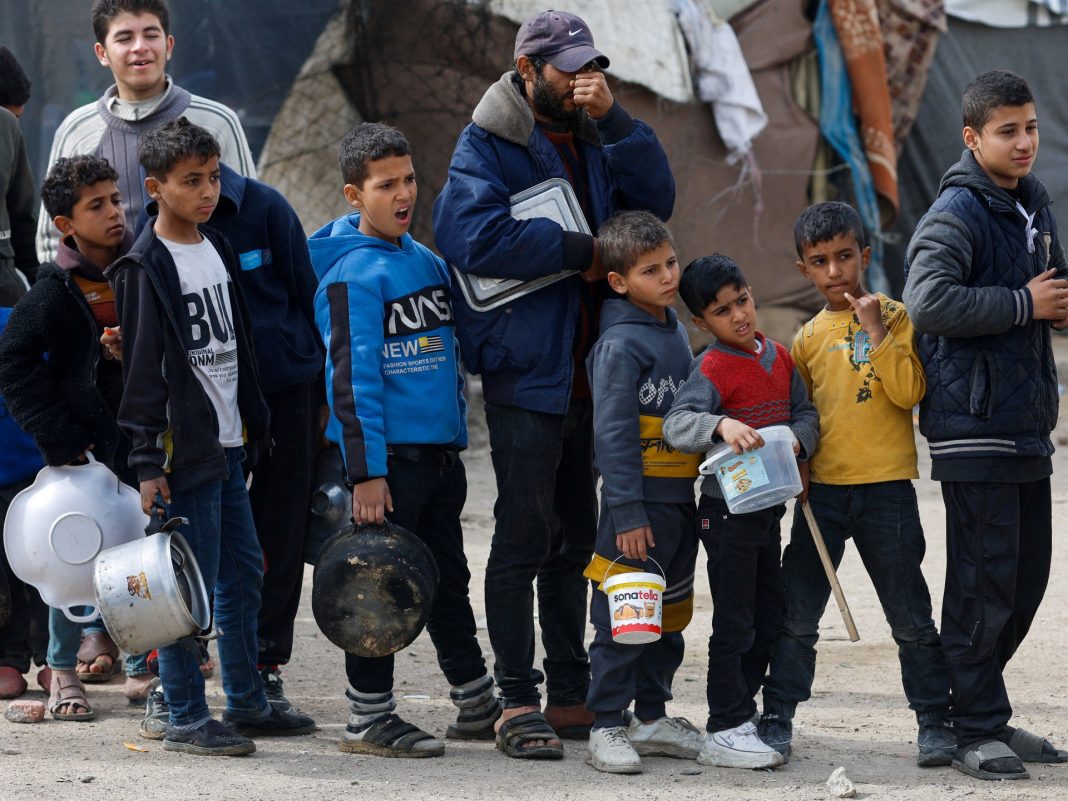The latest suspension on Tuesday increases fears of starvation in northern Gaza, which has been almost completely cut off from aid since late October amid Israel’s devastating war on the enclave.
The UN’s World Food Programme (WFP) said the decision “has not been taken lightly” as it risks people dying of hunger. But it noted that “the safety and security to deliver critical food aid – and for people receiving it must be ensured”.
The agency added it had first suspended deliveries to the north three weeks ago after a strike hit an aid truck. It tried resuming deliveries this week but stated convoys on Sunday and Monday faced gunfire and crowds of hungry people stripping goods and beating a driver.
Footage from the scene of the operations shows Palestinians fleeing to take cover amid the sound of gun shots and clouds of fumes from smoke bombs.
Witnesses say one man died and many others were wounded in the attacks.
The videos also show Palestinian children scooping up spilled flour from the ground after one sack broke open.
The WFP – which has previously warned of famine-like conditions affecting 2.3 million people in Gaza – said its teams “witnessed unprecedented levels of desperation” in the north over the past two days.
The agency added it was working to resume deliveries as soon as possible and called for better security for its staff as well as “significantly higher volumes of food” and the opening of crossing points for aid directly into northern Gaza from Israel.
The suspension of aid to the north comes amid a sharp decline in the entry of aid trucks into the whole of Gaza. Figures by the UN office for humanitarian affairs (OCHA) show the average number of aid trucks entering Gaza has fallen from 140 a day in January to 60 a day in February.
Israel – which controls entry points into Gaza – has opened just one crossing into the enclave despite growing international pressure for the provision of humanitarian aid, including interim rulings by the International Court of Justice.
UN agencies say cumbersome Israeli procedures have slowed crossings of trucks, while right-wing Israeli protesters have blocked trucks at the Kerem Shalom entry point into southern Gaza, saying the Palestinian people should not be given aid.
When supplies do get through to Gaza, UN staff and aid groups are not able to pick them up at crossing points because of “the lack of security and breakdown of law and order”, according to Eri Kaneko, a spokesperson for OCHA. This includes Israel’s targeted killings of Gaza police commanders guarding truck convoys, aid agencies say.
Shane Low, a spokeswoman for the Norwegian Refugee Council, described the conditions for humanitarian workers in Gaza as “unacceptable”.
“In any other context, humanitarians would be pulling out at this point, because it is simply too dangerous,” she told Al Jazeera.
“There is no guarantee of the safety of humanitarian staff, either because of Israeli targeting of convoys, Israeli targeting of police who are there to protect convoys, and of course due to the desperation because of the lack of aid that’s getting in.”
UNRWA, the UN agency for Palestinian refugees, meanwhile said Israeli authorities have denied 51 percent of planned missions to deliver aid to northern Gaza.
“Food insecurity north of Wadi Gaza has reached an extremely critical state,” it said in a post on X.
According to the Palestinian Health Ministry, at least 29,000 Palestinians, most of them women and children, have been killed in Israeli assaults since October 7, when Hamas – which governs Gaza – launched a surprise attack inside southern Israel.
Some 1,139 people were killed in the Hamas attacks in Israel.
